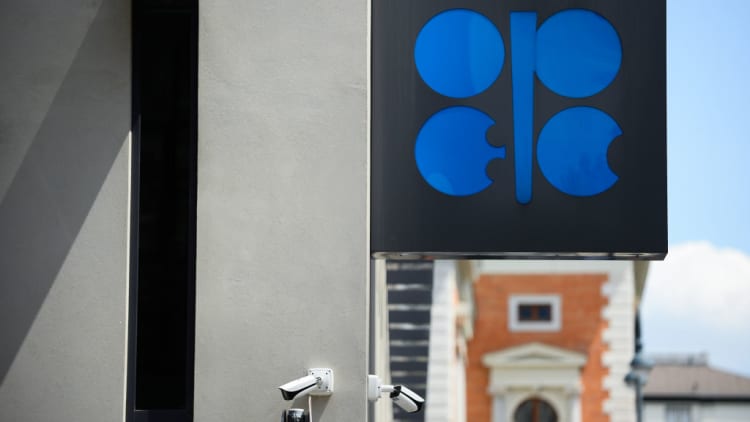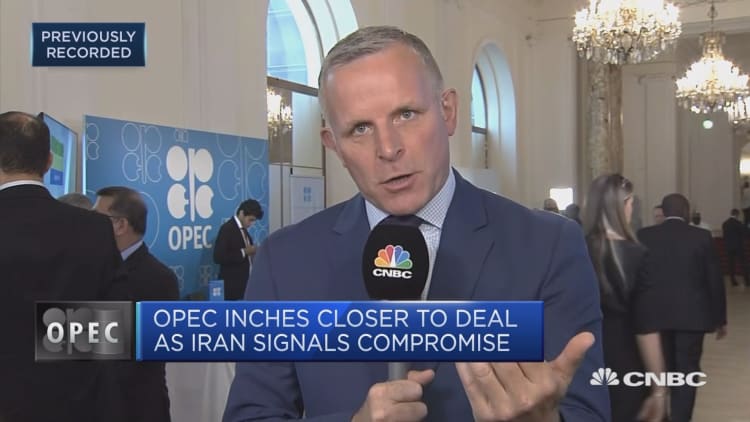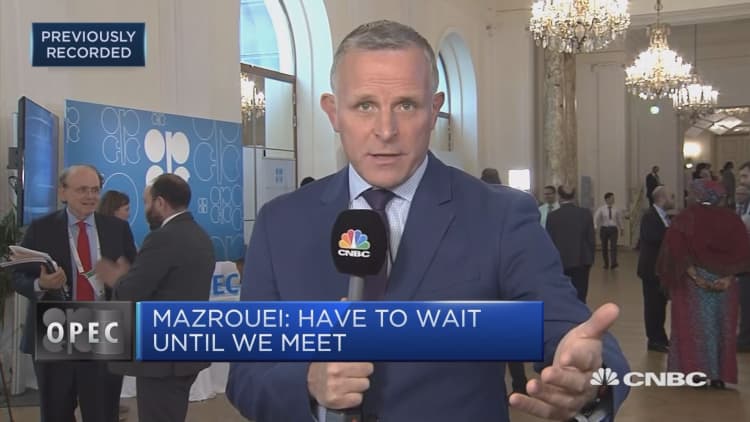OPEC got closer to clinching a deal to supply the world with more oil on Thursday after Saudi Arabia proposed the 14-member oil cartel and its allies increase production by a combined 1 million barrels per day.
Oil ministers have been laying the groundwork all week for Friday's biannual meeting in Vienna, Austria, where OPEC is expected to ease supply constraints that have been in place since January 2017.
However, the prospect of the meeting ending without an agreement remained a possibility, as Iran's oil minister said late Thursday night that he did not believe OPEC could reach consensus on a path forward.
The day began with a warning from Saudi Energy Minister Khalid al-Falih that the world is likely to face a large deficit of oil in the second half of 2018. As a result, OPEC needs to substantially raise output to prevent a market squeeze, he said.
"We will release supply … One million (bpd) sounds like a good target to work with," Falih told reporters.

Industry sources familiar with the oil cartel's deliberations said the actual increase is likely to total around two-thirds of Saudi Arabia's lofty target. That's because some OPEC members would be unable to sufficiently ramp up crude production.
Analysts say supply increases are more likely to fall in a range between 600,000-800,000 bpd. Still, that is substantially lower than the 1.5-million-bpd increase sought by Russia, which is not a member of OPEC but has been coordinating policy with the group for the last 18 months.
OPEC's agreement with Russia and other producers to limit oil output has helped to clear a global supply overhang that weighed on prices for years. But with crude futures recently soaring to multi-year highs on strong demand, dwindling output from Venezuela and renewed U.S. sanctions on Iran, energy ministers are worried about the market overheating.
"One million. [Falih] just threw down the gauntlet," said Helima Croft, global head of commodity strategy at RBC Capital Markets.
"(The) White House will be pleased … but barrel-constrained OPEC producers will probably not be pleased," she told CNBC, referring to the Trump administration's push for OPEC to cap oil prices by raising output.
Major oil importers like India have also expressed alarm at the rising cost of crude.

"Our customers have spoken loudly and we need to listen to them," Falih told reporters on Thursday. He warned that rising oil prices could soon drag on crude demand.
Also on Thursday, OPEC Secretary General Mohammed Barkindo announced that OPEC and its allies will meet in Algiers in September, ostensibly to celebrate two years of cooperation among the two dozen countries in the so-called Vienna Alliance.
That gathering will also include a meeting of the committee that monitors compliance with the agreement among the 24 nations to limit supply. That will give producers an opportunity to review the impact of any production increase they agree to this week, providing something of a concession to nations that opposed raising output.
"It appears to be quid pro quo for Iran," OPEC's third biggest producer and the chief opponent of a supply hike, said Ed Morse, global head of commodities research at Citigroup.
OPEC eyes a path forward
Saudi Arabia and Russia, both of which have the ability to increase production, have pushed for substantial output hikes. But countries without spare capacity — including Iran, Iraq and Venezuela — arrived in Vienna lobbying to keep the supply limits in place.
However, oil-producing nations appeared to inch closer to an output agreement on Wednesday, with OPEC ministers focusing on addressing over-compliance with their historic 2016 deal to curb production.
OPEC and its allies have aimed to keep 1.8 million bpd off the market, but supply disruptions in countries like Venezuela, Angola and Libya have caused the group to overshoot its target. Total production from the Vienna Alliance is down by about 2.8 million bpd, Falih told reporters on Thursday.

Saudi Arabia has also kept more barrels off the market than it originally pledged.
The kingdom now faces the political challenge of parceling out the output increases among participating nations. That entails easing the production constraints enough to meet the world's growing appetite for oil, without giving the impression that a handful of producers are the only beneficiaries.
Along with Saudi Arabia, Kuwait, Russia and the United Arab Emirates also have spare capacity. Raising output would dampen prices, so while those four countries would benefit from selling more oil, supply-constrained countries would be selling the same amount of crude at lower prices.
That has chafed Iran, which faces wide-ranging sanctions after President Donald Trump abandoned the 2015 Iran nuclear deal. Iran's exports are expected to drop later this year as foreign buyers cut ties with the Middle Eastern country to avoid U.S. financial penalties.
However, Iranian Oil Minister Bijan Zanganeh told CNBC on Wednesday evening he is feeling "very good" about production levels, after earlier indicating he could support a deal that tackles over-compliance.

On Thursday evening, Zanganeh briefly attended a committee meeting of nations tasked with monitoring the alliance's output levels. Iran is not a member of the committee, but Saudi Arabia's Falih made special mention of his attendance at a press conference before the meeting.
RBC's Croft said the Saudi gesture was meant to highlight cooperation with Iran and send a message that the Zanganeh is being included in decision-making.
Russian Energy Minister Alexander Novak also attended the press conference. He said the deal between producers calls for flexibility and producers should show they are flexible when supply swings into deficit or surplus.
Sources familiar with the negotiations told CNBC they believe Russia is on board with the Saudi proposal. Iran is expected to also agree to a deal, analysts said, but it's unclear Iran is completely satisfied and its approval may require further negotiation.
It was shortly after Zanganeh left the meeting that he stormed through the lobby of the Palais Hansen Kempinski and said he did not think OPEC would reach an agreement on Friday, according to three people present in the hotel.

